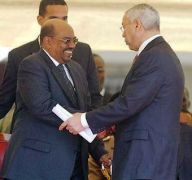US will pledge significant new aid to Sudan
By Carol Giacomo
WASHINGTON, April 8 (Reuters) – The United States and other nations will pledge significant new aid for rebuilding war-torn southern Sudan at a donors conference next week but funds may be unable to flow unless Khartoum ends the violence in Darfur, American officials said on Friday.

|
|
Former U.S. Secretary of State Colin Powell, right, shakes hands with Sudan President Hassan Omer El-Bashir during the Comprehensive Peace Agreement signing, Sunday, Jan 9, 2005, at Nyayo stadium in Nairobi, Kenya. (AP). |
A senior U.S. official said the Bush administration is not explicitly conditioning its aid on an end to the killing and raping of civilians in Darfur.
But “the serious humanitarian and moral catastrophe in Darfur has cast a shadow” over a separate but related North-South peace deal ending 21 years of fighting between Khartoum and southern rebels, he said.
“If the situation in Darfur continues to worsen neither we nor others will be able to support implementation of the comprehensive (North-South) peace agreement,” he told reporters on condition of anonymity.
“The promise of that agreement will have been squandered and the country will enter into a new downward spiral and clearly we don’t want that to happen,” he added.
Deputy secretary of State Robert Zoellick will head the U.S. delegation to the conference in Oslo and announce “a significant financial commitment from the United States to support the full implementation of the Sudan comprehensive peace agreement,” spokesman Richard Boucher told a news briefing.
He and other officials declined to reveal the figure but some reports suggest the new U.S. contribution could be $1.8 billion out of a total $2.6 billion being requested.
Over the past three years, the United States has committed over $1.6 billion to Sudan for humanitarian assistance and conflict resolution in Darfur, as well as reconstruction and development, and support for the North-South peace agreement.
Under January’s peace deal, Khartoum and the former rebel Sudan People’s Liberation Movement (SPLM) will set up a coalition government, decentralize power, share oil revenues and form joint military units.
Implementation of the deal “has fallen fairly significantly behind schedule,” the U.S. official said, adding that Zoellick will use meetings with Sudanese leaders in Oslo, and later in Sudan, to urge them to quicken the pace at a “critical juncture.”
Some critics question new U.S. aid for Sudan in the context of the North-South peace deal when Khartoum-armed nomadic Arab militia known as Janjaweed continue to wage a campaign in Darfur against black African villagers. The United States has called this campaign genocide.
Boucher argued that with its new aid, the United States would be “supporting the creation of a new governmental mechanism for Sudan that unites the nation and that offers opportunity for everybody … That’s not the same as supporting the existing government.”
The senior official who briefed reporters on background said the administration believes “large scale organized violence (in Darfur) has significantly diminished” since January.
Unacceptable atrocities continue against civilians and attacks against humanitarian workers have risen, but international pressure on Sudanese factions and the presence of 2,200 African Union peacekeepers in the country are having a positive effect, he said.
Tens of thousands of people have been killed in the fighting in Darfur and more than 2 million have fled their homes to makeshift camps in the remote, western desert region.
The crisis was triggered in February 2003 when pastoral rebel groups took up arms against the government in a struggle over power and scarce resources.
Khartoum retaliated by arming the Janjaweed.
